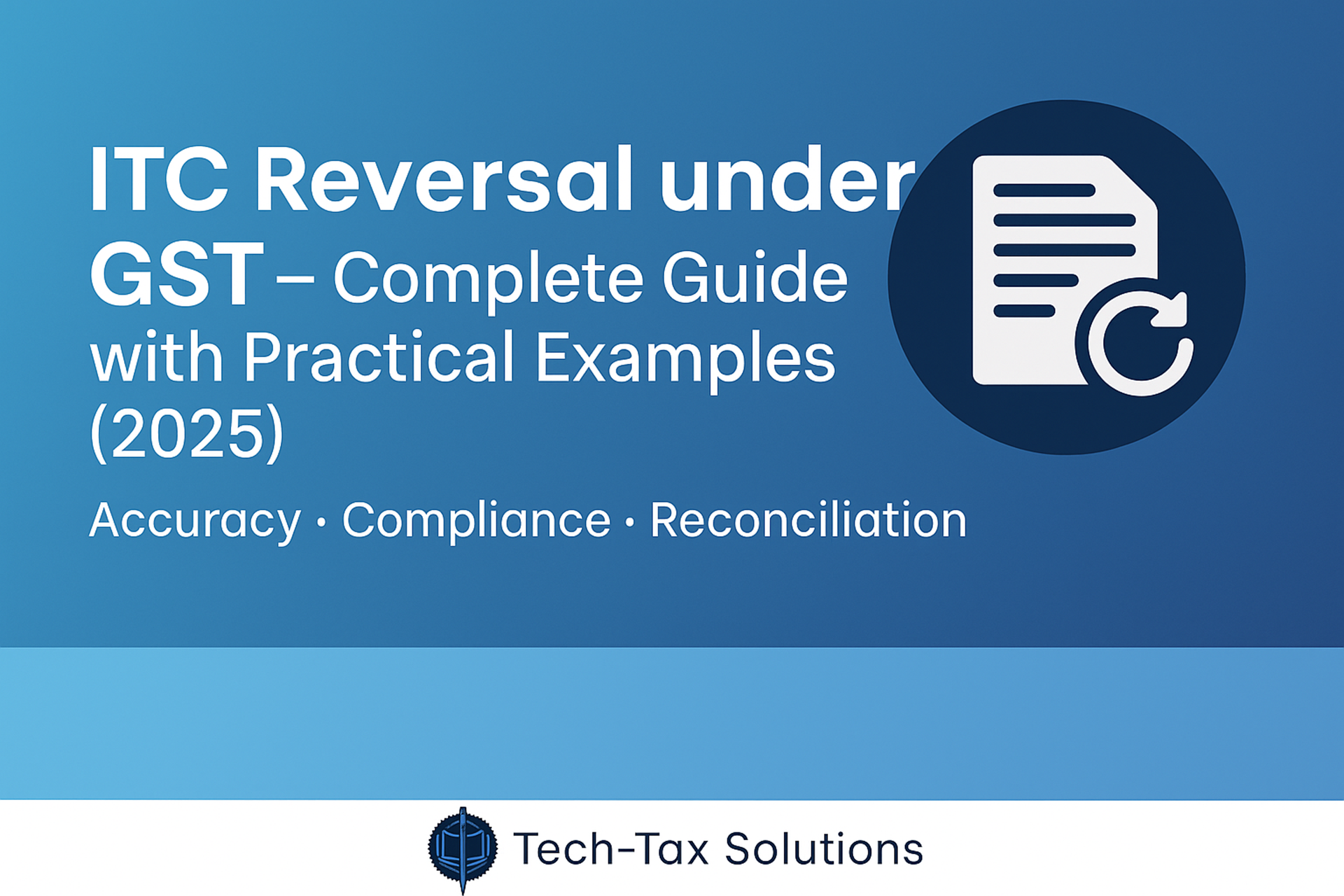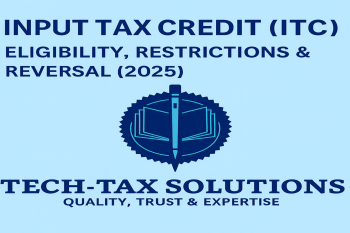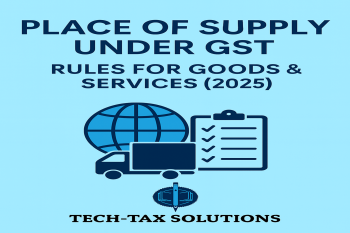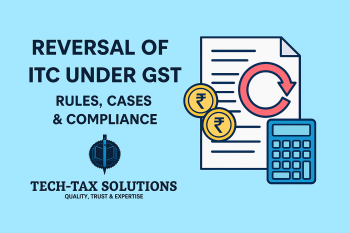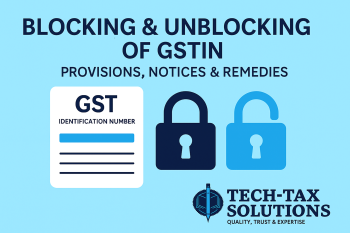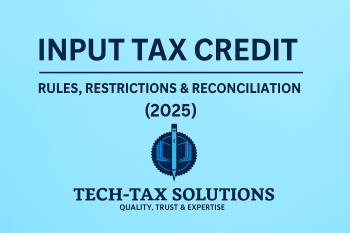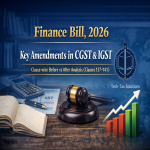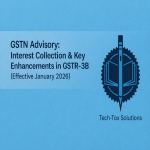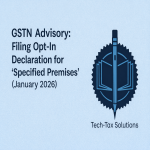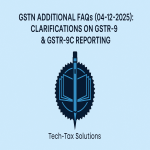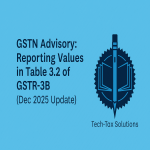🔹 Introduction
Input Tax Credit (ITC) is one of the most valuable features under GST, allowing taxpayers to claim credit on the taxes paid for inputs, goods, and services. However, the GST law also mandates ITC reversal under certain conditions — such as non-payment to suppliers, use for exempt supplies, or non-compliance by vendors.
With increased departmental scrutiny and new Rule 37A and Section 16(2)(aa) enforcement, understanding when and how to reverse ITC has become crucial for every registered taxpayer.
This article explains the ITC reversal rules, calculations, and best practices to ensure full compliance under GST for FY 2025–26.
🔹 Legal Framework
ITC reversal is governed by the following provisions under the GST law:
-
Section 16(2) of the CGST Act, 2017 – Conditions for availing ITC.
-
Section 17(1)–(5) – Restrictions and apportionment of ITC.
-
Rule 37 – ITC reversal if payment not made to suppliers within 180 days.
-
Rule 37A (Inserted via Notification No. 26/2022–CT) – Reversal for ITC claimed when supplier has not filed GSTR-1/3B.
-
Rule 42 & 43 – Apportionment of ITC for inputs and capital goods used for both taxable and exempt supplies.
📘 Objective:
To ensure that taxpayers claim ITC only when legally eligible and reverse it when the credit conditions are violated.
🔹 Scenarios Where ITC Reversal is Required
| Scenario | Applicable Rule / Section | Remarks |
|---|---|---|
| Non-payment to supplier within 180 days | Rule 37 | Reverse ITC with interest, reclaim on payment. |
| Supplier fails to file GSTR-1 or GSTR-3B | Rule 37A | Reverse ITC in next return if supplier defaults. |
| Inputs used for exempt/non-business purposes | Section 17(1) & 17(2) | Partial reversal based on turnover ratio. |
| Blocked credits under Section 17(5) | Section 17(5) | Reversal required (e.g., personal use, motor vehicles). |
| Cancellation of GST registration | Section 29 | Reverse ITC on closing stock and capital goods. |
| ITC wrongly availed or excess claim | Section 73/74 | Voluntary reversal with DRC-03 payment. |
🔹 Rule 37 – ITC Reversal for Non-Payment to Suppliers
If payment is not made to the supplier within 180 days from the date of invoice:
-
ITC must be reversed along with interest @ 18% p.a.
-
You can reclaim the ITC once payment is made.
📊 Example:
ABC Traders avails ITC of ₹45,000 on a purchase invoice dated 1 April 2025, but payment is made on 15 November 2025 (after 180 days).
➡️ ITC ₹45,000 to be reversed in October 2025 GSTR-3B with interest from 1 April to 27 September 2025 (180 days).
🔹 Rule 37A – ITC Reversal for Supplier Non-Compliance
Introduced via Notification No. 26/2022, Rule 37A requires ITC reversal if:
-
Supplier fails to file GSTR-1 and/or GSTR-3B for that period,
-
And such invoice is reflected in GSTR-2B but not in supplier’s tax payment records.
Taxpayer must reverse ITC by 30th November following the end of the financial year, if supplier has not filed returns by that time.
📘 ITC can be re-availed once supplier files pending returns and tax is paid.
🔹 Rule 42 & 43 – Proportionate ITC Reversal for Exempt Supplies
If inputs or capital goods are used for both taxable and exempt supplies, ITC must be reversed proportionally.
📊 Example:
Total turnover = ₹50 lakh
Exempt turnover = ₹10 lakh
Total ITC = ₹2 lakh
➡️ Reversal = ₹2,00,000 × (10/50) = ₹40,000
🔹 ITC Reversal During GST Cancellation
When a taxpayer applies for cancellation, ITC on stock, semi-finished goods, and capital goods must be reversed or paid back.
-
Value calculated at tax on transaction value or ITC balance, whichever is higher.
-
Declared in GSTR-10 (Final Return).
🔹 Reversal vs Reclaim – Key Difference
| Aspect | Reversal | Reclaim |
|---|---|---|
| Trigger | Violation of ITC condition | Condition later satisfied |
| Example | Non-payment within 180 days | Payment made later |
| Form | GSTR-3B or DRC-03 | GSTR-3B of subsequent month |
| Interest | Applicable till reversal | Not applicable on reclaim |
🔹 Common Mistakes in ITC Reversal
❌ Not reversing ITC when supplier defaults on filing.
❌ Missing ITC reversal in GSTR-3B for delayed payments.
❌ Incorrect interest calculation under Rule 37.
❌ Claiming ITC on blocked credits (Section 17(5)).
❌ Ignoring reversal during cancellation or exempt turnover periods.
🔹 Best Practices for Accurate ITC Management
✅ Reconcile GSTR-2B vs GSTR-3B monthly.
✅ Use automated reconciliation tools to flag supplier non-filing.
✅ Maintain a 180-day payment tracker for vendors.
✅ Review Rule 37A compliance before annual filing.
✅ Conduct quarterly ITC health checks and audit reviews.
🔹 Practical Example
Case Study:
M/s Greenline Logistics claimed ₹1,20,000 ITC in May 2025 for invoices from a supplier who didn’t file GSTR-1 for that period.
➡️ As per Rule 37A, ITC must be reversed in November 2025 GSTR-3B, if the supplier hasn’t filed returns by then.
➡️ ITC can be reclaimed later once the supplier files pending GSTR-1/3B.
🔹 FAQs
Q1. Is interest payable on ITC reversal under Rule 37A?
➡️ No specific interest prescribed yet, but department may invoke Section 50(1) if delayed beyond due month.
Q2. Can ITC reversed under Rule 37A be reclaimed later?
➡️ Yes, once the supplier files GSTR-1/3B and tax is duly paid.
Q3. What happens if ITC reversal is missed?
➡️ You may receive a DRC-01 notice for ineligible ITC under Section 73/74.
Q4. Can ITC reversal be adjusted through electronic credit ledger?
➡️ No, reversal must be offset in cash ledger or through tax payment.
Q5. Does ITC reversal impact working capital?
➡️ Yes, delayed supplier compliance or reversals directly affect cash flow — proactive tracking helps minimize this.
🔹 Conclusion
Proper ITC management is the foundation of sound GST compliance.
With Rule 37A enforcement and enhanced ITC tracking via GSTR-2B, businesses must regularly reconcile and reverse ineligible ITC to avoid penalties.
📌 For expert assistance in ITC reconciliation, reversal, or GST audit support, contact Tech-Tax Solutions – Quality, Trust & Expertise in Ghaziabad, Noida & Delhi.
